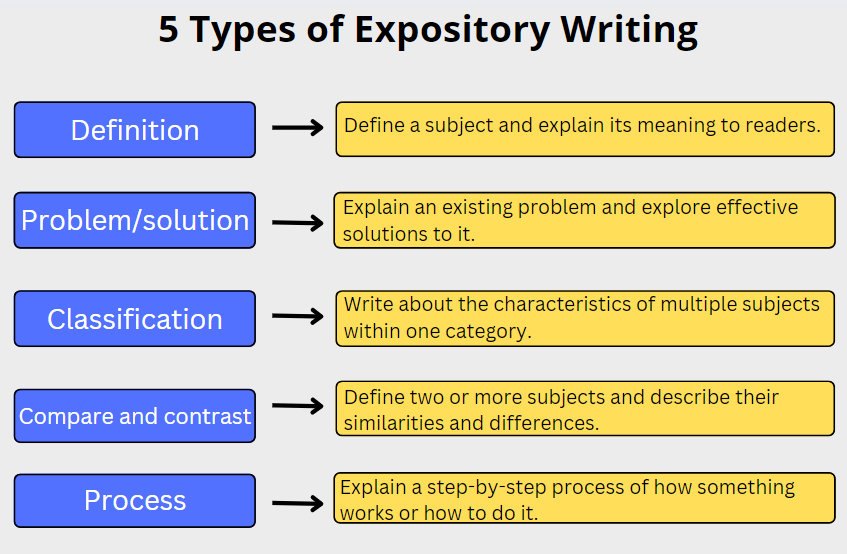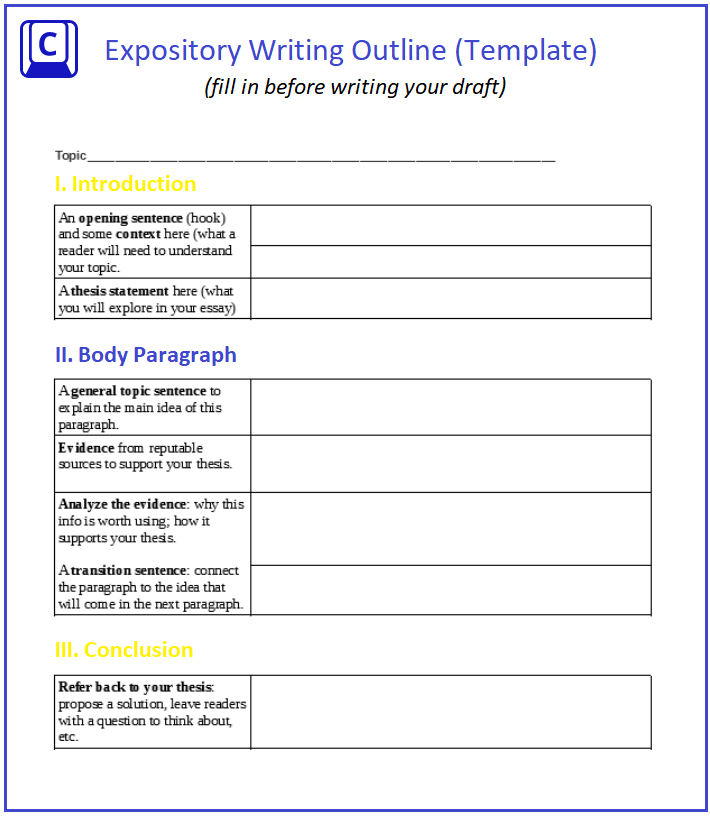Expository Writing: How to Craft Such Essays When Assigned
Expository writing is among the most common assignments students get in college. A tiny problem:
While teachers assign expository essays often enough for mentees to get an idea of how to do this type of academic paper, many students still have difficulty writing them.
Indeed:
With so many essay types to deal with in college, it’s challenging to understand and remember all the differences between them: narrative, argumentative, persuasive, and others – it seems impossible to master and get high grades for all of them.
No worries! This article will tell you everything a student needs to know about expository writing. And if you still find it too hard or time-consuming to craft, feel free to ask Copycrafter’s assignment assistance professionals for help.

What is Expository Writing?
Below you’ll find more information on expository writing definition, purpose, and types.
Expository Writing Definition
Expository writing is a form of structured academic paper using facts to investigate a topic and inform readers about it.
It’s critical to understand the difference between expository and argumentative essays here:
- Argumentative essays: A student uses arguments and counterarguments to prove their opinion on the topic.
- Expository essays: A student doesn’t take any side, doesn’t develop any arguments, and doesn’t express their opinion on the topic. Focus on providing facts to inform and explain, with no personal evaluation: Do your best to have a neutral point of view.
The characteristics of expository writing aren’t that difficult to remember. Expository essays:
- Teach readers about the topic.
- Provide detailed information (insights) on the topic.
- Describe and explain facts on the topic.
- Are written with formal language, in the 3rd person (he, she, it, they), and in a precise, logical manner.
The Purpose of Expository Writing
Expository writing is about providing the reader with a factual and objective description of a topic. The purpose is to present the information in a linear and logical format, with no author’s opinion or attempts to change the reader’s mind or perspective.
Examples of expository writing include journalistic articles, business writing, or science papers.
Why do you need to write expository essays in college?
No, it’s not because your professors hate you and want to bury you in tons of writing assignments. They want to help you develop valuable skills that will also come in handy when the study years are over. When working on expository writing, you gain:
- Critical thinking. Doing research for your paper, you learn to evaluate sources, evidence, and facts from different angles and perspectives, which is a must-have skill for Gen Z today. In the world of content shock and a short attention span, it’s critical to understand what information is worth your attention and trust.
- Prioritization. While you gather information for your expository paper, you need to stay precise when writing it. Thus you learn to prioritize one fact or evidence over others and express your thoughts briefly.
- Time management and organization. With expository writing, you learn to organize thoughts, express them logically, and save time communicating with people. These are must-have soft skills in many professional spheres today, so they won’t go in vain once you get them.
Types of Expository Writing
Expository assignment writing has several types, depending on how you want to structure it to represent the information better. The most common types of expository essays are five:

- Definition (descriptive). It’s an essay where you define a subject and explain its meaning. For example, you write about a historical figure and tell readers about his actions, motivations, places he visited, etc.
- Problem/solution (cause/effect). Here you explain an existing problem (the cause of something) and then explore effective solutions for it. Speaking of expository writing, these are usually papers about the relations between two subjects (cause and effect) or how specific problems have been solved.
- Classification. Such expository essays are about the characteristics of many subjects within one category. You break down a broad topic into categories, start with a general one, and then define and explain each subgroup within it.
- Compare and contrast. Here you define two or more subjects and describe their similarities and differences.
- Process (how-to). These essays explain a step-by-step process of something: how it works or how to do it. This blog post is a kind of process expository writing, by the way: Here we tell you how to write essays step by step.
How to Write an Expository Essay?
And now, to the most interesting part:
Let’s reveal the process of expository assignment writing, step by step!
Step 1: Choose a Topic
As a rule, teachers assign a topic for your expository writing. But sometimes they say you’re free to choose what to write about, and that’s when your brainstorming begins.
How to choose a good topic for your expository essay?
You can write about everything: health, politics, education, movies, science, history, social media, etc. Think of the niche you know best and make a list of topics that are interesting to you: Consider something you can explain to readers (it will be easier to research). Also, think of topics that will meet your teacher requirements (if they gave you any).
Try to avoid too general topics. Yours need to be specific for the audience to get interested. Here go a few topic examples:
- Some practical advice to tackle bullying in schools.
- How social media helps students pass exams.
- The reasons for terrorism in modern times.
- Where to invest money after college, and why.
- The science behind love: how we need to understand this feeling.
So, here are the rules again: A topic should be interesting to you and easy to research as you’ll need to find credible references for it; also, you should be able to explain it to the reader.
Step 2: Write a Thesis
You can’t write an essay without a thesis statement: It’s the heart of your paper, and your teacher will pay much attention to it. No need to mention that your overall grade for expository writing will depend on how well you introduce a thesis.
What is a thesis in essays?
An essay thesis is a sentence or two in the introduction. It’s a claim that identifies the central idea and purpose of your writing.
Please note that a thesis is NOT a mere fact but a statement that gives readers something to think about. It’s an issue you’ll describe and explain throughout your essay.
Step 3: Outline Your Expository Essay
Before you sit and write your essay draft, it would be helpful to prepare a detailed outline, aka a plan for you to know what to include in every paragraph.
Speaking of paragraphs, by the way:
Expository essays have the standard structure of any academic paper you write in college: an introduction, body paragraphs (3-4, depending on your topic and teacher requirements), and a conclusion. When writing an outline, do your best to mention a thesis statement in the introduction, prepare factual and logical evidence for each body paragraph, and think of a thesis restatement in the conclusion.
This template can help you write detailed outlines for your expository writing assignments:

Step 4: Write an Introduction
When the thesis and outline are ready, it’s time to write your expository essay. Start with an introduction and ensure to mention the following elements there:
- 1 sentence: a general statement on the topic with an attention-grabbing hook for readers.
- 2-3 sentences: the context for your readers to understand the topic.
- 1 sentence: a thesis statement for readers to see what you’ll expose in the essay.
For many students, introductions are the most challenging part of essay writing. They sit and stare at a blank page, can’t find any words, and don’t know how to start an essay. If you’re among them, here’s a tip:
Write an introduction after the other parts of your essay. It’s okay to craft a body and a conclusion first: Thus, you’ll see all the covered points and extract a hook and a thesis from there.
Step 5: Draft an Essay Body
When writing essay paragraphs, refer to your thesis statement so you don’t miss any critical points. Each paragraph starts with a topic sentence to introduce what you will talk about, and it should contain the evidence (facts, data, quotes, etc.) to support your information.
Share facts that will help readers understand your point. Use straightforward language in your essay to avoid biased information or misunderstanding: active verbs, clear words, and meaningful adverbs.
Complete each paragraph with a logical transition to the next one: Use linking words and phrases to reinforce your message and make it easier for readers to follow your thoughts.
Step 6: Write a Conclusion
A conclusion is critical in expository writing because it wraps up your thesis and leaves readers with thoughts on the topic.
Important:
- Do not repeat (rewrite) your thesis from the introduction. You need to explain how the information from the essay helps to come up with this conclusion.
- Do not introduce any new points or ideas. You need to conclude the thoughts you’ve already covered in the essay body.
Your expository essay conclusion should have a minimum of three sentences:
The first one sums up what you said, the next one explains how your essay exposed your thesis, and the final one is something positive for readers to remember your essay and think about the topic you shared.
Step 7: Proofread and Edit Your Essay
Finally, the most crucial moment comes: Once the draft is ready, it’s time to proofread and edit it if necessary. But please do not do that just after writing. Give your text a few days to rest — and go back to check it later. It will help you see an essay with a fresh eye and notice tiny drawbacks you would have missed before.
So, first, read the draft to check if your essay:
- has a clear thesis;
- provides an unbiased analysis of facts and examples;
- supports all the information with evidence from credible resources;
- has logical transitions between sentences and paragraphs;
- is clear, linear, and logical.
After that, proofread your essay to fix typos, grammar, and punctuation mistakes. A good practice for that is reading your text out loud: It helps notice words, phrases, and grammar constructions that sound weird. Ensure you use clear sentences and straightforward language.
If proofreading and editing still sound challenging, try some online looks like Grammarly or Hemingway App. Or, you can always ask for professional editing help from Copycrafter or other corresponding services: A specialist checks your essay and gives feedback on what to improve there.
Expository Essay Writing Tips to Follow
Now that you know a step-by-step process for expository essay writing, here go some tiny yet practical tips to make it easier:
- Write a catchy headline for your essay for readers to get interested in it.
- No matter how well you know the assigned topic, you’ll need to research it before writing.
- It’s okay to start expository writing where you know the information best. It’s not a must to start with the introduction: Feel free to write an essay body or conclusion first; you’ll have time to revise and edit it anyway.
- Be clear and use concise language: Remember that your task is to inform and share facts, not write about your thoughts on the topic.
- Avoid biased information; use reputable resources for references: academic journals, studies, .edu sources, etc. Forget about Wikipedia.
- Consider your writing voice and tone: Expository essays are formal and go from the 3rd person, remember? So, no slang, redundant information, jokes, creative writing tricks, “I” and “we,” etc.
- Be linear and organize all the information in your essay logically so that it’s easy for readers to follow it. Use transitional words and phrases between paragraphs to link everything naturally.
- When editing, read your draft out loud: It will be easier to notice typos or grammar mistakes; plus, you’ll “hear” how it sounds and revise all weak points if necessary.
- Please do your best to complete the first draft of your expository paper a few days before the deadline and wait a day before revising it. Thus, you’ll look at it from a fresh perspective and can notice some drawbacks you didn’t see when writing.
- Ask a friend to read your essay. As a reader, not an author, they can tell if you need to revise anything for it to sound better.
FAQs
-
What is expository writing?
Expository writing is a form of text that aims to inform readers and help them learn something new about the topic. It’s factual, linear, and objective. An author doesn’t express their opinion and doesn’t develop any arguments to persuade readers about the subject.
-
What is the purpose of expository writing?
The purpose of expository writing is to share facts and evidence on the assigned topic to inform and educate readers about it. There shouldn’t be any personal opinions, arguments, or biased information: Expository writing is factual and objective. The goal is to give facts readers need about the topic to deepen their understanding.
-
How does narrative differ from expository writing?
Narrative writing is about telling stories to readers. It can be a short personal story, fiction, or any other story that conveys emotions and experience. Expository texts are about facts, descriptions, and clear (logical) explanations to give information that educates readers about something.
-
What are examples of expository writing?
Examples of expository writing are journalistic articles in newspapers and magazines, science papers exploring and explaining some concepts, and business texts describing how different processes work or what a person needs to do to make them work. Textbooks, technical guides, news — all they refer to expository writing, either.
-
Can anyone help me with expository writing assignments?
Sure! Besides tons of online guides explaining how to write expository essays (like this one), you can go to thematic forums or communities to ask questions and get informative help there. Or, you are always welcome to ask for professional writing help here at Copycrafter: Our academic writers are happy to assist with any questions you might have on your expository writing assignment.